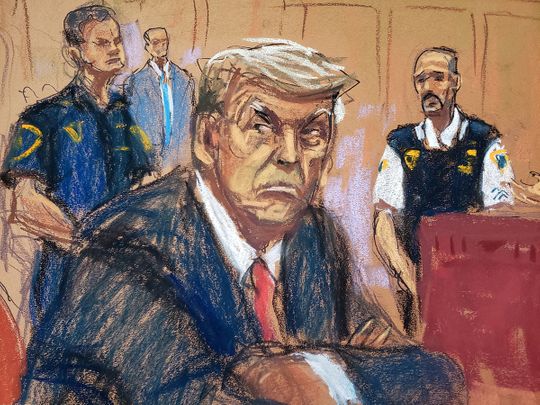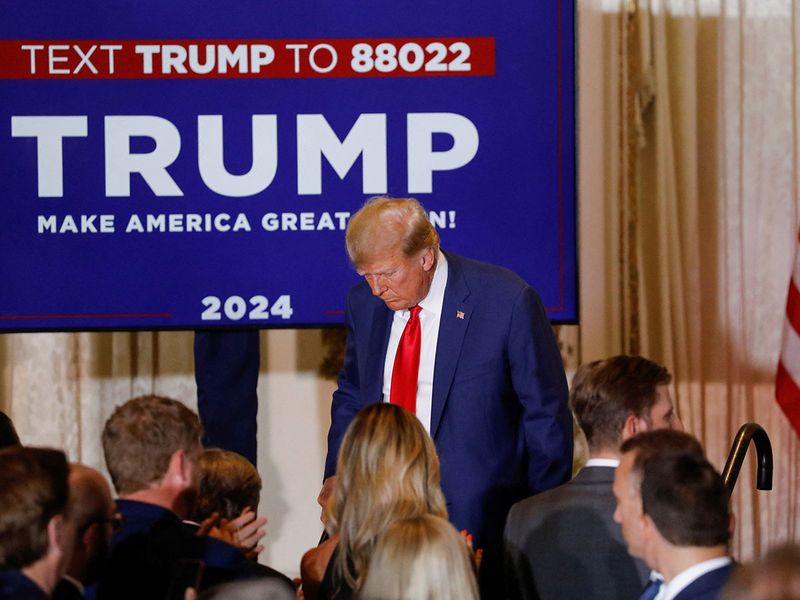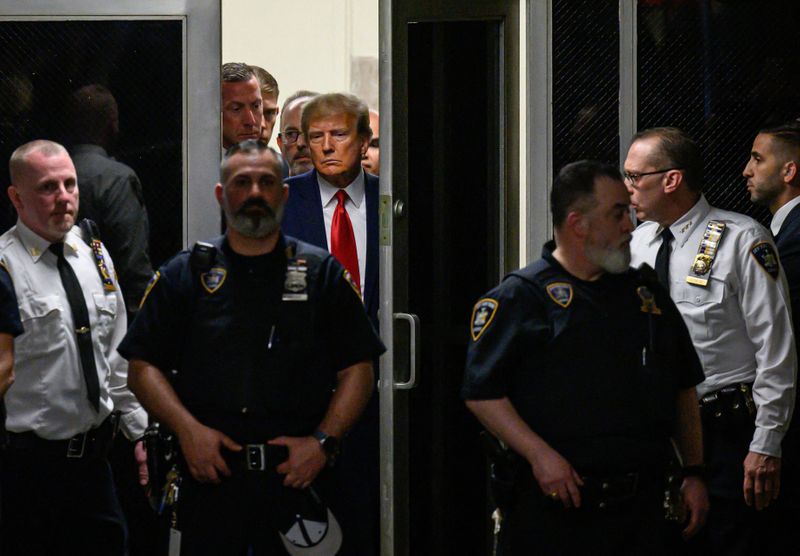
It was on Monday afternoon when an indicted Donald Trump flew out of West Palm Beach on his patriotically painted red-white-and-bue private jet to New York — the city he was born and grew up in, the city whose ostentation, brashness and cheek match his — where he was expected to be arraigned in court the following day.
The nation that following day held its breath when Mr. Trump, the former billionaire business mogul who rose to the presidency, a man not known to suffer from low self-regard, entered the hallway of the Manhattan Criminal Courthouse and into the back corridors to the district attorney’s office, where he was formally arrested and fingerprinted ahead of his arraignment, which made him the first sitting or former US chief executive in history to face criminal charges.
Read more
- Former US President Donald Trump pleads not guilty to 34 felony charges
- Video: Donald Trump has been booked and charged - What happens now
- In Pictures: Donald Trump's journey from Trump Tower to New York courthouse
- Stormy, Trump and more: The names to know in historic hush-money case
- Former US President Donald Trump pleads not guilty to 34 criminal charges in New York
However, in deference to a defendant who once sat behind the Resolute Desk in the Oval Office as the 45th president of the United States of America, Trump did not have his hands cuffed or his mugshot taken, as would’ve been the case with other suspects charged with a felony.
“Everyone stands equal under the law”, Manhattan district attorney Alvin Bragg said at a press conference after the arraignment. “No amount of power and no amount of money changes that”, a view of the legal system made explicit as far back as medieval times by the English jurist Henry de Bracton (d. 1269) in his treatise, On the Laws and Customs of England, in which he opined that “no one is above the law”.

Fraudulently falsifying business records
True indeed. But still the spectacle nevertheless represented a surreal and historic moment without precedent in American history. The disruption of cohesion projected in the image of an American president under arrest, being fingerprinted like a criminal, had the queer upruptess and illogic of dreams, dreams being a place where reality is often turned on its hinges.
Yet the ignominy did not faze diehard Trump supporters, who drank from it as if it were the well of life, convinced that their Trumpist vision will prevail. After all, had not their hero been able earlier to raise well over $5 million a mere 48 hours after news of his indictment broke on Thursday? Does that not attest to the resilience and durability of that vision?
The indictment, which was unsealed only after the court convened on Tuesday, charged the former president with “repeatedly and fraudulently falsifying business records to conceal conduct that hid damaging information from the voting public during the 2016 presidential election”, to wit, not only a hush money deal with Stormy Daniels, but also a conspiracy to orchestrate a broader scheme aimed at paying a Playboy model and a former doorman at Trump Tower who had scandalous secrets to reveal about the then presidential hopeful.
More bad news for Trump
In effect, the New York district attorney was charging Donald J. Trump with relatively low-level felonies that carried a maximum four-year sentence, though if he were convicted, a judge could sentence him to probation.
The bad news for the former 45th president of the United States, however, is that his New York indictment should be the least of his worries at this time, for he faces three other, more serious criminal investigations related to his infamous phone call to Georgia’s secretary of state, in which he sought to undermine the results of the 2020 elections; to his alleged incitement of the mob on Jan. 6, which led to the storming of the US Capitol; and to his mishandling of classified documents, which he unlawfully kept at his Mar-a-Lago residence in Palm Beach.
But it really was his New York indictment, which essentially related to tawdry matters, that seemed to garner the most attention.
A writer for the New York Times, who was in attendance, had this to say soon after the conclusion of the proceedings: “It is perhaps unsurprising, given the crass and circus-like political era that Mr. Trump ushered in — one marked by the elevation of D-List celebrities, uncouth social media posts and a casual relationship with the truth — that his first indictment stems from lies about a tryst with a porn star”.

Donald J. Trump was in and out of New York in no time after the hearings. His jet took him back to Palm Beach that same day, where, at 8:30pm, while standing at a podium in his Mar-a-Lago residence, he delivered a speech to an adoring crowd, which including fire-breathing GOP Rep. Marjorie Taylor Greene. In it he painted the indictment as the Democrats’ latest attempts at kneecapping him.
He said: “I never thought that (the indictment) would happen. The only crime I committed is to fearlessly defend our nation from those who seek to destroy it”.
Sadly, there are a lot of Americans around — a lot more than we care to admit — who do not consider that claim laughable.
Fawaz Turki is a noted journalist, academic and author based in the US. He is the author of The Disinherited: Journal of a Palestinian Exile.








